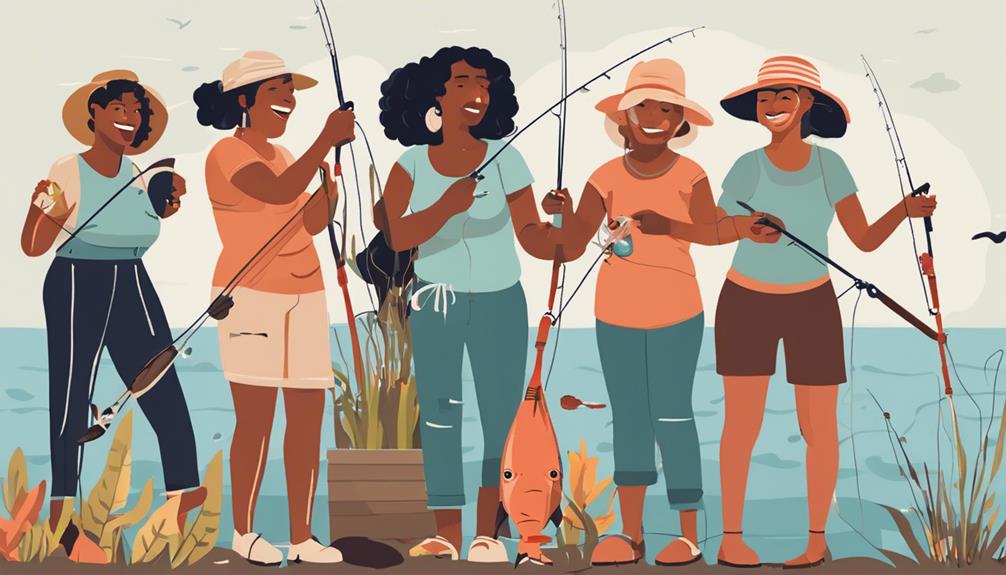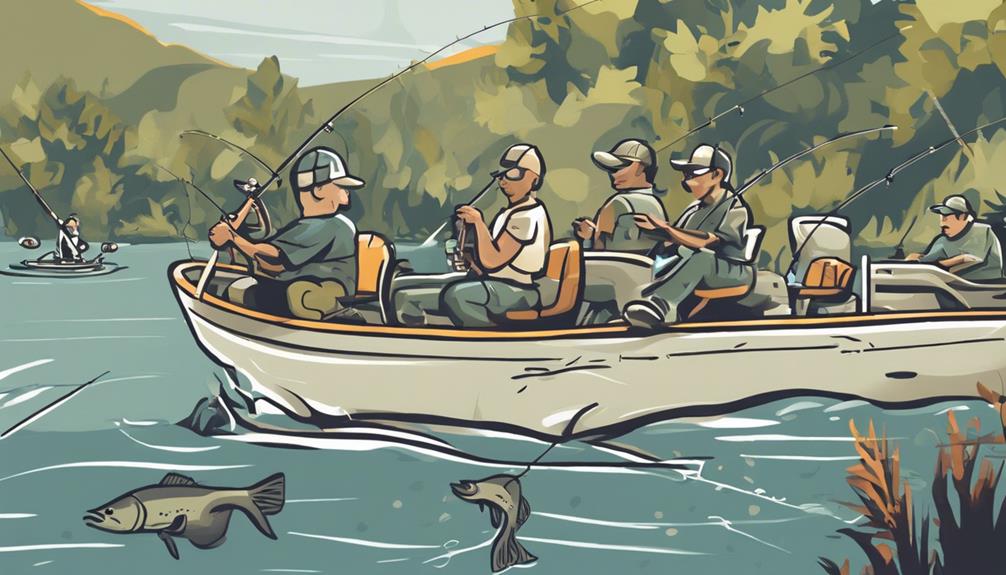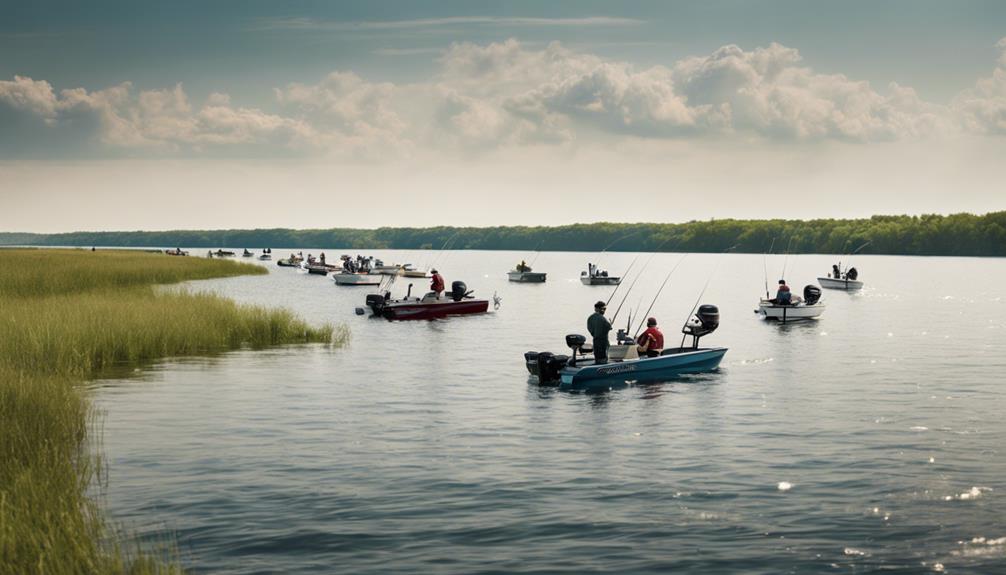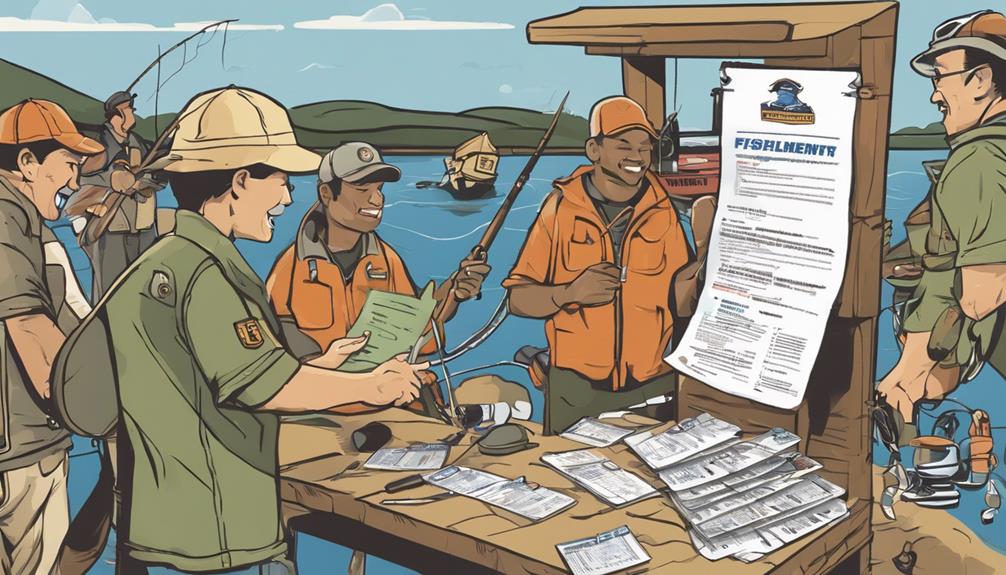If you've ever wondered why there aren't more fishing tournaments for women, it's because of a mix of reasons. Female anglers face challenges like lack of representation, outdated stereotypes, few sponsorship opportunities, unequal prize payouts, and accessibility issues. However, exciting strategies are emerging to boost women's involvement. Creative marketing, social media engagement, tailored networking events, and challenging cultural norms are paving the way for inclusivity. By addressing these barriers and fostering a supportive community, women can feel empowered to thrive in fishing tournaments. Would you like to explore how these strategies are making a difference for female anglers?
Lack of Female Representation
If you've ever attended a fishing tournament, you might've noticed the striking lack of female representation among the participants. This gender bias in fishing tournaments is a real issue that affects participation rates and the overall inclusivity of the sport.
While fishing is often seen as a male-dominated activity, there's a growing interest among women to engage in this recreational pursuit, yet their presence in tournaments remains minimal.
Gender bias in fishing tournaments is evident not only in the low numbers of women participating but also in the lack of support and resources available to female anglers. Many women feel discouraged from entering tournaments due to the perceived notion that fishing is a masculine activity. This stereotype can create a barrier for women who are interested in competitive fishing but feel like they don't belong in that space.
The low participation rates of women in fishing tournaments not only limit the diversity of competitors but also hinder the growth and evolution of the sport. By addressing and challenging these gender biases, fishing tournaments can become more inclusive and welcoming to all anglers, regardless of gender. Encouraging more women to participate in tournaments can lead to a more vibrant and dynamic fishing community, enriching the sport for everyone involved.
Stereotypes in Fishing Culture
Stereotypes prevalent in fishing culture can significantly impact the inclusivity and diversity of participants in angling activities. When it comes to fishing, gender biases and stereotypes are unfortunately still pervasive, influencing how individuals perceive and engage with the sport.
Here are four ways in which stereotypes in fishing culture can affect participation rates:
- Skill Expectations: Assumptions that women are less skilled anglers than men can deter women from participating in fishing tournaments, creating a self-fulfilling prophecy where fewer women are involved due to these misconceptions.
- Equipment Preferences: Stereotypes often dictate that certain types of fishing gear are more suitable for men, leading to limited options for women or discouraging them from exploring the sport further.
- Social Stigmas: The perception that fishing is a masculine activity can create social stigmas for women who participate, making them feel unwelcome or out of place in fishing communities.
- Representation in Media: Limited representation of women in fishing media reinforces stereotypes and can make it challenging for women to see themselves as part of the angling community, further reducing their participation rates.
Limited Sponsorship Opportunities
Limited sponsorship opportunities present a significant challenge for women involved in fishing tournaments, impacting their ability to access resources and support for competing in the sport. Sponsorship challenges are prevalent due to underlying gender bias in the fishing industry. Women often face difficulties in securing sponsorships compared to their male counterparts, leading to unequal opportunities for growth and participation in fishing tournaments.
Gender bias plays a crucial role in the limited sponsorship opportunities available to women in fishing. Sponsors may be more inclined to invest in male anglers due to traditional beliefs that fishing is a male-dominated sport. This bias perpetuates a cycle where women struggle to secure the financial backing needed to compete at the same level as men. As a result, female anglers may find themselves at a disadvantage when trying to access top-tier equipment, training programs, and travel funds essential for tournament success.
Overcoming these sponsorship challenges requires a concerted effort from the fishing community to recognize and address gender bias within the industry. By actively seeking out and supporting female anglers, sponsors can help level the playing field and provide women with the resources they need to thrive in fishing tournaments. Increasing awareness of these sponsorship disparities is crucial in fostering a more inclusive and equitable environment for all anglers, regardless of gender.
Unequal Prize Payouts
Unequal prize payouts in fishing tournaments often highlight the disparities faced by female competitors, revealing systemic challenges that hinder their progress and recognition in the sport. Here's why this issue is crucial:
- Gender Discrimination: The unequal prize payouts directly reflect the gender discrimination prevalent in fishing tournaments. Female anglers often receive significantly lower prize money compared to their male counterparts, perpetuating the notion that women's achievements are valued less in the sport.
- Pay Gap: The pay gap in fishing tournaments is stark, mirroring larger societal inequalities. Despite showcasing equal skill, dedication, and effort, female competitors consistently receive lower financial rewards than male winners, reinforcing the existing gender pay disparities.
- Impact on Recognition: Unequal prize payouts not only affect the financial well-being of female anglers but also impact their recognition and visibility within the fishing community. Lower prize money diminishes the acknowledgment of women's accomplishments, further marginalizing their contributions to the sport.
- Barriers to Participation: The pay gap resulting from unequal prize payouts can act as a deterrent for women considering entering fishing tournaments. The perception of limited financial rewards compared to the effort invested creates barriers that dissuade female anglers from fully engaging in competitive fishing, restricting their opportunities for growth and success in the field.
Accessibility Barriers
Navigating physical obstacles and logistical challenges create significant barriers for female anglers in accessing fishing tournaments. When it comes to gear affordability, many women find themselves constrained by the high costs associated with fishing equipment. Quality rods, reels, lines, and tackle can be expensive, making it challenging for women to invest in the necessary gear to participate competitively in tournaments. Without access to affordable gear, many female anglers are deterred from joining fishing competitions.
Location accessibility also plays a crucial role in limiting women's participation in fishing tournaments. Many tournaments are held in remote or difficult-to-reach locations, posing a challenge for women who may not have easy access to transportation or the means to travel long distances. Moreover, some fishing spots lack proper facilities for female participants, such as changing rooms or restrooms, making it uncomfortable for women to take part in these events.
To address these accessibility barriers, tournament organizers can consider hosting events in more accessible locations with adequate facilities. Additionally, promoting gear rental services or providing affordable gear options can help lower the financial barriers for female anglers. By creating a more inclusive and accessible environment, fishing tournaments can encourage greater participation from women and foster a more diverse angling community.
Lack of Promotion
Promoting fishing tournaments effectively to reach a diverse audience, including women, is crucial for increasing participation and fostering a more inclusive angling community. To address the lack of promotion in fishing tournaments for women, consider the following:
- Outreach Campaigns: Launch targeted outreach campaigns that specifically highlight the benefits and opportunities available to women in fishing tournaments. By tailoring the messaging to resonate with potential female participants, you can attract more diverse anglers to the events.
- Marketing Strategies: Develop innovative marketing strategies that showcase the excitement and camaraderie of fishing tournaments. Utilize visuals, testimonials, and success stories from female anglers to create a compelling narrative that inspires women to join in on the fun.
- Social Media: Leverage the power of social media platforms to amplify the reach of fishing tournament promotions. Create engaging content, host live Q&A sessions with female anglers, and collaborate with influencers to generate buzz and attract a wider audience.
- Networking Events: Organize networking events tailored to women in angling to provide a platform for connecting, sharing experiences, and building a supportive community. These events can serve as valuable touchpoints for promoting upcoming tournaments and nurturing interest among female anglers.
Cultural Norms in Tournament Fishing
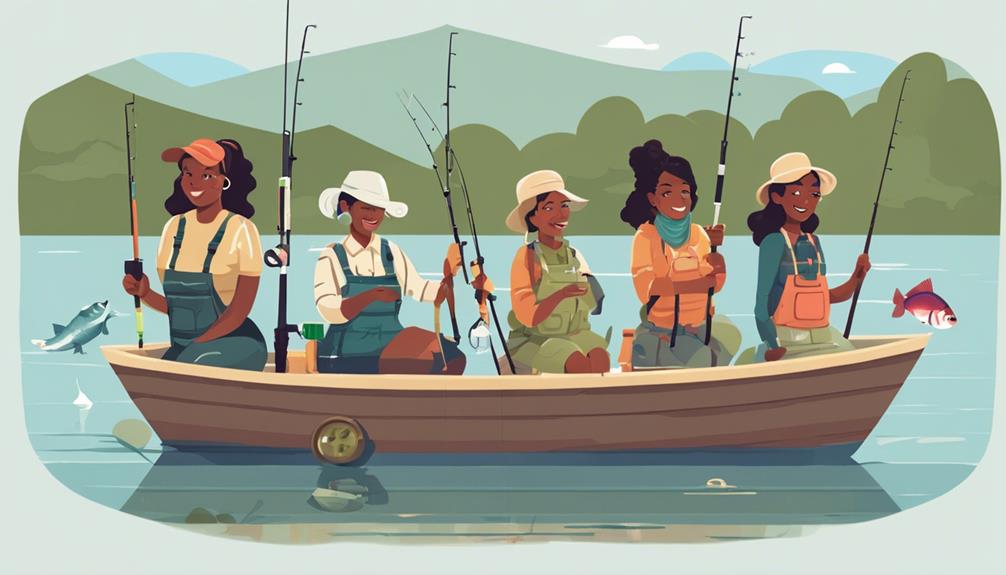
To foster a more inclusive angling community and encourage greater participation from diverse groups, including women, it's imperative to examine and address the cultural norms that may impact their involvement in tournament fishing. Gender dynamics play a significant role in shaping the landscape of tournament fishing. Historically, fishing has been portrayed as a male-dominated activity, with stereotypes perpetuating the idea that it's a sport more suited to men. These ingrained beliefs can create barriers for women who wish to participate in fishing tournaments, as they may feel unwelcome or out of place in what's seen as a traditionally masculine space.
Social expectations also play a crucial role in influencing women's participation in fishing tournaments. From a young age, individuals are often socialized into specific gender roles, with fishing being categorized as a hobby or sport more aligned with masculinity. These societal norms can deter women from pursuing fishing as a competitive activity, leading to a lack of representation in tournament settings.
Strategies for Inclusivity
Embracing diversity and fostering a sense of belonging within the angling community are key components in developing effective strategies for inclusivity in fishing tournaments for women. To create a more welcoming environment and encourage participation, consider the following:
- Outreach Programs: Establish outreach programs specifically targeted at women who may be interested in fishing but haven't yet participated in tournaments. These programs could include educational initiatives, promotional events, and partnerships with community organizations to spread awareness and attract new participants.
- Community Engagement: Foster a sense of community by organizing social gatherings, networking events, and online forums where female anglers can connect, share experiences, and support each other. Building a strong community can help women feel more included and motivated to participate in fishing tournaments.
- Skill Building Workshops: Offer skill-building workshops tailored to women of all experience levels. These workshops can cover a range of topics such as fishing techniques, boat handling, tackle selection, and conservation practices. By providing educational opportunities, you can empower women to feel more confident and competent in their fishing abilities.
- Mentorship Opportunities: Create mentorship programs that pair experienced anglers with newcomers or those looking to enhance their skills. Mentors can provide guidance, advice, and support to help women navigate the world of fishing tournaments and overcome any barriers they may face. Encouraging mentorship can help build a supportive network within the angling community and promote inclusivity for women in fishing tournaments.
Frequently Asked Questions
Do Women Have the Same Fishing Skills as Men?
You've got the skills, just like anyone else! Stereotypes might suggest otherwise, but in fishing, gender doesn't determine ability.
When it comes to skill comparison, women can reel in those big catches just as well as men. The gender dynamics in fishing tournaments shouldn't hold you back.
Embrace the competition, show off your talent, and let your fishing prowess speak for itself!
How Can Sponsorship Impact Women's Participation in Fishing Tournaments?
Sponsorship impact in fishing tournaments can be huge for women. It boosts visibility, creating more opportunities. With a strong support network, women feel empowered to compete and excel.
The financial and promotional backing from sponsors not only helps women showcase their skills but also encourages growth in the sport. As more women take the stage, the fishing community becomes more diverse and inclusive, benefiting everyone involved.
Are Prize Payouts in Fishing Tournaments Gender-Biased?
Gender equality in prize distribution at fishing tournaments is crucial. It ensures fair recognition of skill and effort, regardless of gender. By analyzing prize payouts, you can identify any gender biases and advocate for more equitable distribution.
It's essential to promote an inclusive environment where all anglers are valued equally for their achievements. Encouraging transparency and equality in prize awards fosters a more diverse and supportive fishing community for everyone to enjoy.
What Physical Barriers Do Women Face in Tournament Fishing?
When it comes to tournament fishing, women can face physical barriers like equipment accessibility issues and gender stereotypes. These challenges can limit representation and hinder social support networks.
Overcoming these obstacles is crucial for creating a more inclusive environment in the fishing community. By addressing these concerns, we can work towards leveling the playing field and encouraging more women to participate in fishing tournaments.
Is There a Lack of Awareness About Women's Fishing Achievements?
You may find that there's indeed a lack of awareness about women's fishing achievements. Gender stereotypes and media representation often overshadow the accomplishments of female anglers in the fishing world.
By highlighting women's successes and talents in fishing, we can help break down these barriers and create more opportunities for women to showcase their skills in tournaments.
Let's work together to promote and celebrate women's achievements in fishing!
Conclusion
In conclusion, it's time to break down the barriers and make space for women in fishing tournaments.
By addressing the lack of representation, challenging stereotypes, and providing equal opportunities for sponsorship and prize payouts, we can create a more inclusive and diverse fishing community.
Let's work together to promote and support women in fishing, so everyone can enjoy the thrill of competition and camaraderie on the water.
